Public Health News
Joining the Leadership Team
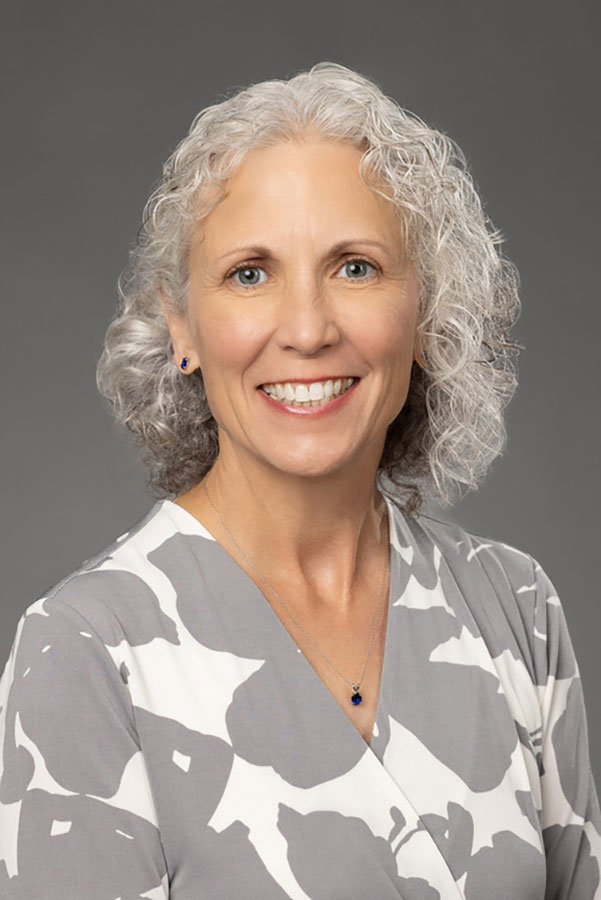
Mary E. Graham, Ph.D., professor in the Department of Sport Management, has been named Falk College Associate Dean of Faculty Affairs effective Jan. 2, 2024. This newly created leadership position reports to Falk College Dean Jeremy Jordan and is dedicated to faculty development and success. In this role, Graham will guide all Falk College efforts related to faculty development—from hiring to retirement—and work closely with university offices and leadership in Academic Affairs, University Counsel, Equal Opportunity Compliance, Human Resources, and Office of Research.
“I am excited to appoint Dr. Graham to this new role for Falk College,” says Jeremy S. Jordan, Dean of Falk College. “I am very confident that she will be able to further the support and development of our faculty based on her wealth of professional experiences and academic expertise.”
As Falk College Associate Dean of Faculty Affairs, Graham will work with department chairs to develop strategic hiring plans for faculty and oversee the successful execution of faculty searches. She will participate in faculty review processes, including recommendations for contract renewals and promotion and tenure, and manage operational aspects of faculty affairs. Together with Falk College leadership, Graham will steer the college towards enhanced faculty research and teaching excellence.
“Falk College has an exceptionally talented, diverse faculty with unparalleled dedication to the student experience and the creation of new knowledge,” says Graham. “I am honored to serve as Associate Dean of Faculty Affairs in service to my faculty colleagues and the linked missions of Falk College and Syracuse University. I look forward to collaborating with our visionary Dean, Jeremy Jordan, and his leadership team on strategic and operational faculty matters.”
Graham joined the Falk College faculty in 2012 and is also affiliated faculty in the Whitman School of Management. She teaches applied courses in organizational behavior and strategic human resource management, as well as diversity in sport organizations at the undergraduate, graduate, and executive levels. An expert in gender disparities in employment, she has conducted numerous American Association of University Women salary negotiations workshops for students since 2009.
In 2022, Graham was named Syracuse University’s faculty athletics representative (FAR) to the NCAA and the Atlantic Coast Conference (ACC). In this capacity she serves as a key advisor to Chancellor Kent Syverud and Provost Gretchen Ritter on policy proposals and issues affecting student-athletes’ academic and overall wellbeing, working closely with Tommy Powell, Assistant Provost for Student-Athlete Academic Development; Athletic Director John Wildhack; and their teams of professionals. Graham chairs the Faculty Oversight Committee on Athletics, which reviews student-athlete academic data and conducts exit interviews of departing student-athletes.
She previously served as a Syracuse University Provost Faculty Fellow from 2018 to 2020, where she worked with the Provost and University Senate to develop and implement campus-wide shared competencies for undergraduate students. Graham has been a University Senator since 2018, and she currently serves on the Senate Committee on Athletic Policy.
Prior to joining Syracuse University, Graham held faculty positions in business schools at Clarkson University, George Washington University, and Georgia State University. She has served as a visiting scholar at National Taiwan University of Science and Technology, National Central University in Taiwan, and at the Federal Reserve Bank of Atlanta. She also has prior work experience with several members of the U.S. House of Representatives. Graham has published extensively and has been widely cited in the areas of human resource management (HRM), public policy and employment discrimination, gender in employment and HRM in supply chains. She is currently studying the equal employment opportunity transparency among professional sport teams, and the impact of concussions on player misconduct.
Graham is on the Editorial Board of the journal Human Resource Management (Wiley), where she previously served as an associate editor. Her professional memberships include the Society for Human Resource Management; and the Academy of Management, where she serves on the executive committee of the Research Methods Division.
A former CPA, Graham has a B.S. in Accounting from Le Moyne College and work experience in public accounting and human resource management. Graham earned both her M.S. and Ph.D. degrees in Industrial and Labor Relations from Cornell University, specializing in human resource management, organizational behavior, and gender studies.
Staying Ahead of COVID
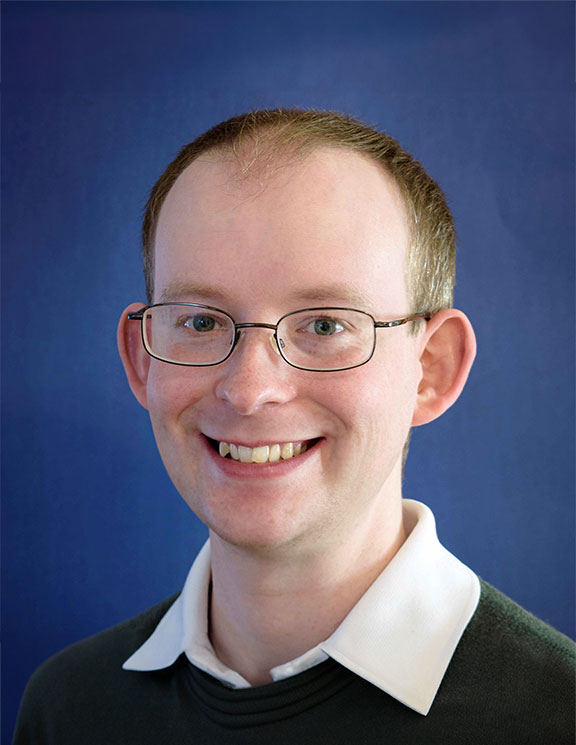
Testing wastewater for COVID-19 provides a better forecast of new COVID hospital admissions than clinical data, according to a Syracuse University research team led by postdoctoral researcher Dustin Hill.
The COVID-19 pandemic has been a burden on the U.S. health care system since its arrival in early 2020. COVID remains a threat to our communities, particularly during the winter months when new cases and hospitalizations are likely to surge. The ability to predict where and when new patients will be admitted to hospitals is essential for planning and resource allocation.
“Our findings indicate that wastewater surveillance improves prediction models for hospitalizations by 11 percent over models that use case data at the county level and by 15 percent for regional hospitalization estimates,” said Hill, an environmental data scientist and epidemiologist who works in the Department of Public Health at Syracuse University’s Falk College of Sport and Human Dynamics. “When looking at how many beds a hospital has available, those percentages can make a big difference in whether that hospital is going to have space for new patients or not, and this data can help them get ready for changes.”
Hill led a project that used wastewater surveillance data in predictive models to improve estimates for new COVID hospital admissions in New York State. The research team’s results were published recently in the peer-reviewed journal Infectious Disease Modeling and were gathered in collaboration with State University of New York at Albany, University at Buffalo, State University of New York College of Environmental Science and Forestry, Stony Brook University, and the New York State Department of Health.
Throughout the pandemic, hospitalization forecasting models have relied heavily on clinical data collected from polymerase chain reaction (PCR) and antigen tests. But these data can be biased because of a lack of widespread testing and may not be quick enough to indicate a surge.
In their study, the researchers combined wastewater surveillance data (how much SARS-CoV-2 is found in wastewater) with clinical case and comorbidity data to predict the seven-day average of new hospital admissions 10 days after the wastewater sample collection.
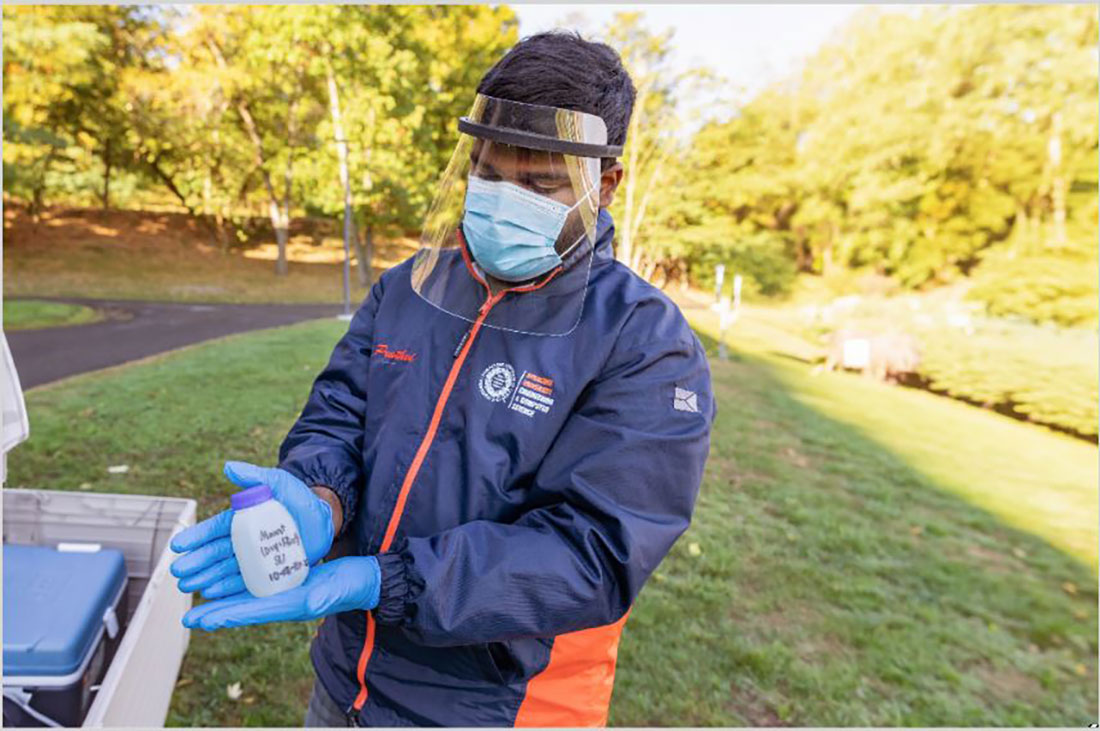
Wastewater data are being collected across New York State through the New York State Wastewater Surveillance Network, and that data can be used to continuously update forecasting predictions each week. According to the research, the average difference between predicted hospitalizations and observed hospitalizations was 0.013 per 100,000 population, or 1.3 in 10,000,000 population, providing high accuracy.
The New York State Wastewater Surveillance Network is testing for COVID in at least one wastewater treatment plant in each of the state’s 62 counties, covering a population of more than 15.3 million. The New York State Wastewater Surveillance Network dashboard provides the most recent statistics regarding the network.
The research team is exploring how their methods to predict COVID hospitalizations can be further refined and applied to other infectious diseases such as RSV and influenza as wastewater surveillance expands to cover these public health threats.
“Predicting future hospitalizations using wastewater data helps get our public health partners in front of surges before they happen so they are prepared when new patients need to be admitted and can distribute resources accordingly,” Hill says. “The methods we developed here are going to be instrumental for tracking the diseases we already know about, and perhaps even more important for the diseases that could arise in the future.”
From the Finish Line to the Classroom
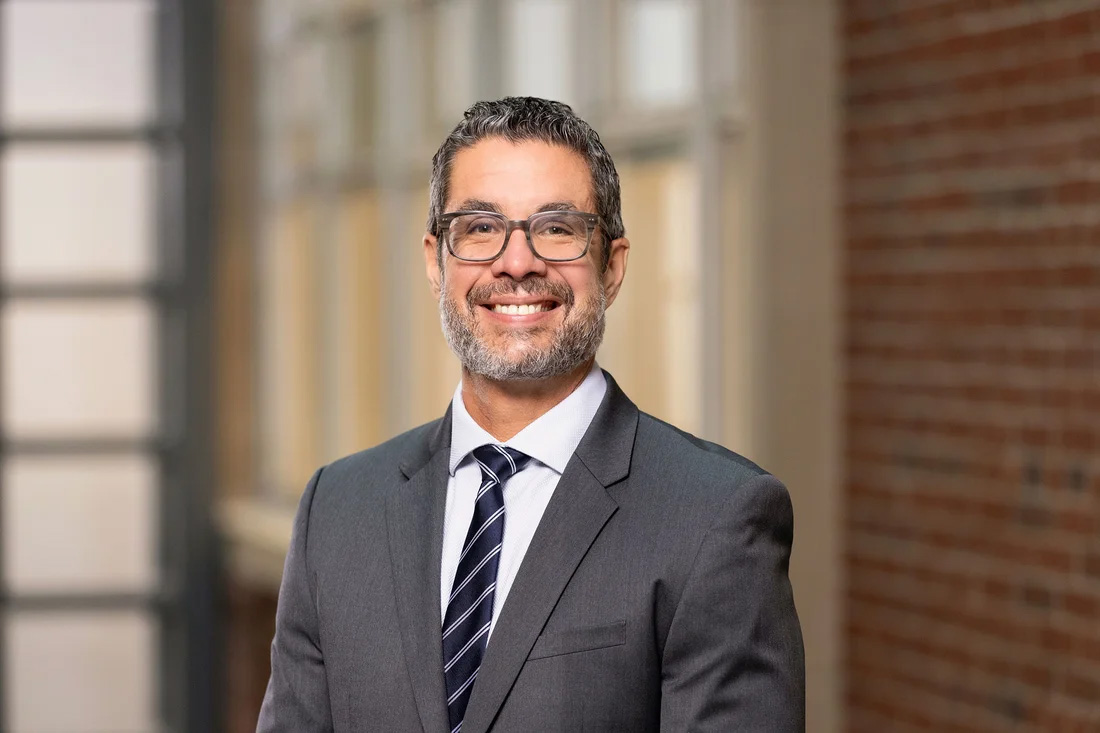
What five words best describe you?
Well, this is what I would hope for: Kind, empathetic, fun(ish), focused, humble.
Three fun facts about yourself that others may not know?
I have run 12 marathons and 25 half-marathons. I love live music and try to go to as many concerts as a I can. One of my favorite places to visit is Japan—I love the people and the culture.
Do you play a sport or follow a sports team?
During COVID I bought a Peloton bike, so now I spend a lot of time riding a bike that goes nowhere. After living in Philadelphia for 15 years, I tend to root for the Phillies and Eagles.
Favorite band?
Pearl Jam, I am old.
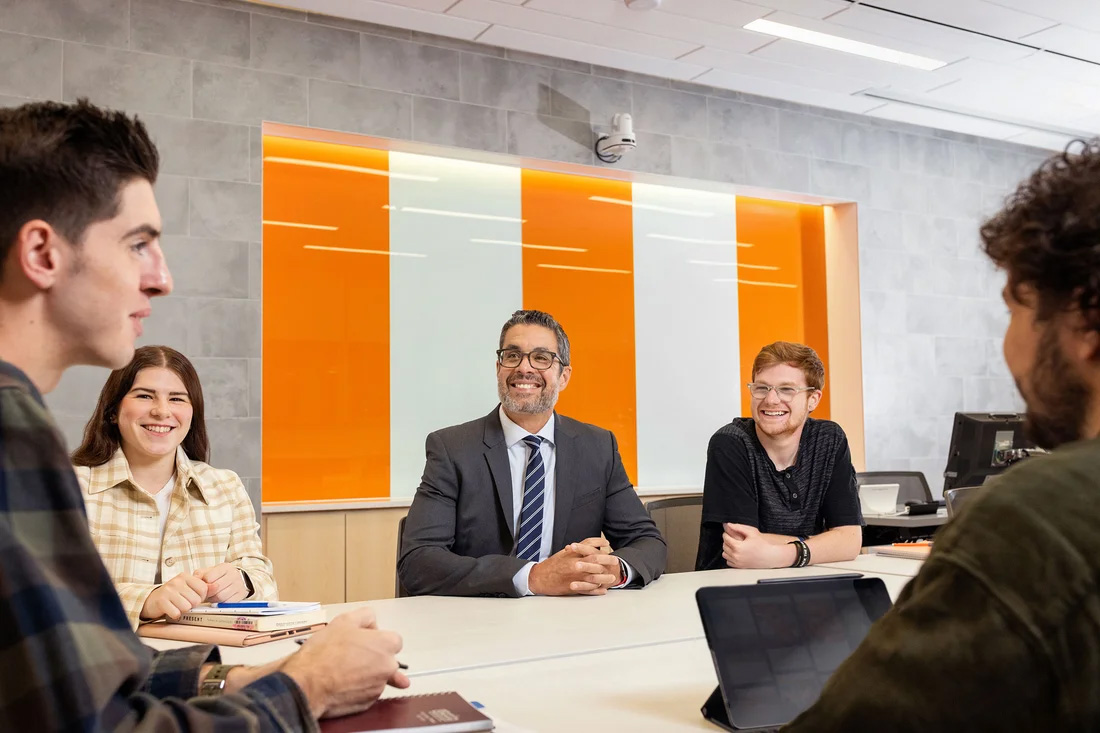
Favorite podcast, book, movie or hobby you’ve enjoyed recently?
I have been reading Lincoln in the Bardo by George Saunders. It is a unique book that I have enjoyed quite a bit. Fun that he is a faculty member at Syracuse.
Most interesting travel experience you’ve had?
I love to travel abroad and experience all that is available at the destination, especially the food. The most epic travel day I have had was in Tokyo. The day started with a bike tour through the city where we stumbled upon one of the best Oktoberfest celebrations I have seen (it was in May by the way). The day ended with some amazing street food and a visit to the robot bar. I got to share this day with my spouse, Laurel, and a good friend, which made it even more special.
Best advice you’ve received?
Listen more, talk less.
What most appeals to you about living in Central New York?
I have really enjoyed learning about all the different outdoor activities and festivals.
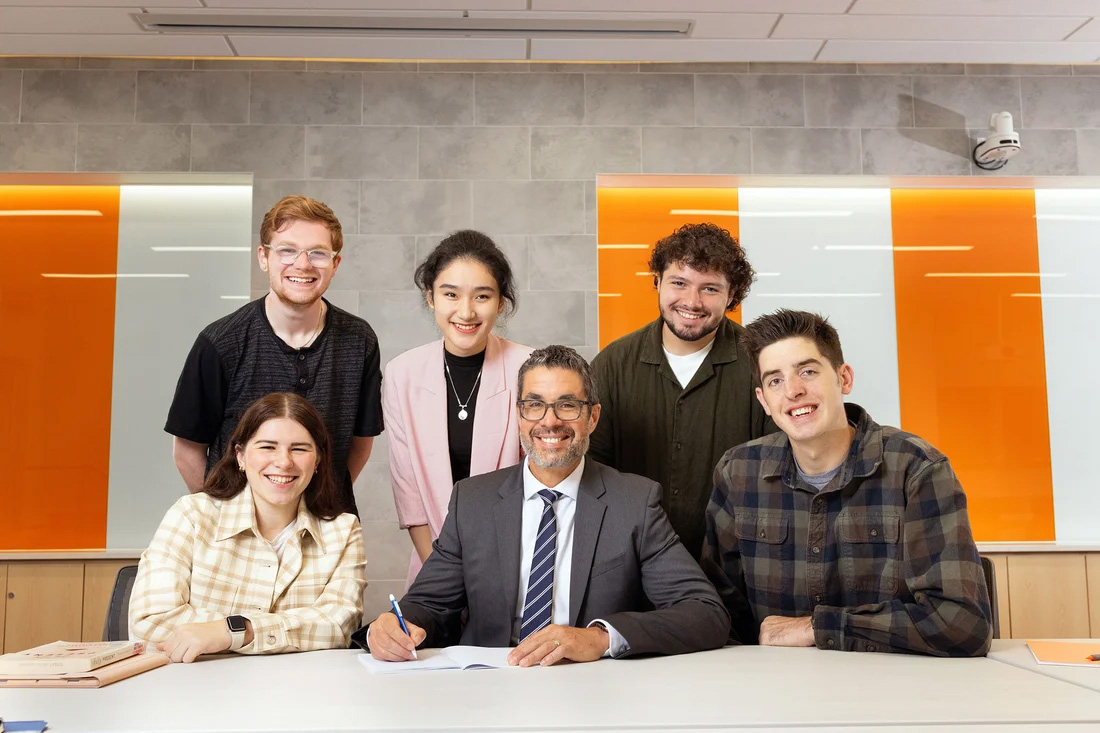
How do you bring out the best in your students?
Understanding their academic and career aspirations and making sure we provide the necessary support and resources for them to be successful. We work collaboratively with our students to help them achieve their goals.
What do you look most forward to in your role as dean?
Working with the faculty and staff to provide a transformational experience for our students. We will tell the story of Falk, in part, through the outcomes of our students.
An SU Story by Maren Powell originally published on November 3, 2023.
A Groundbreaking Approach
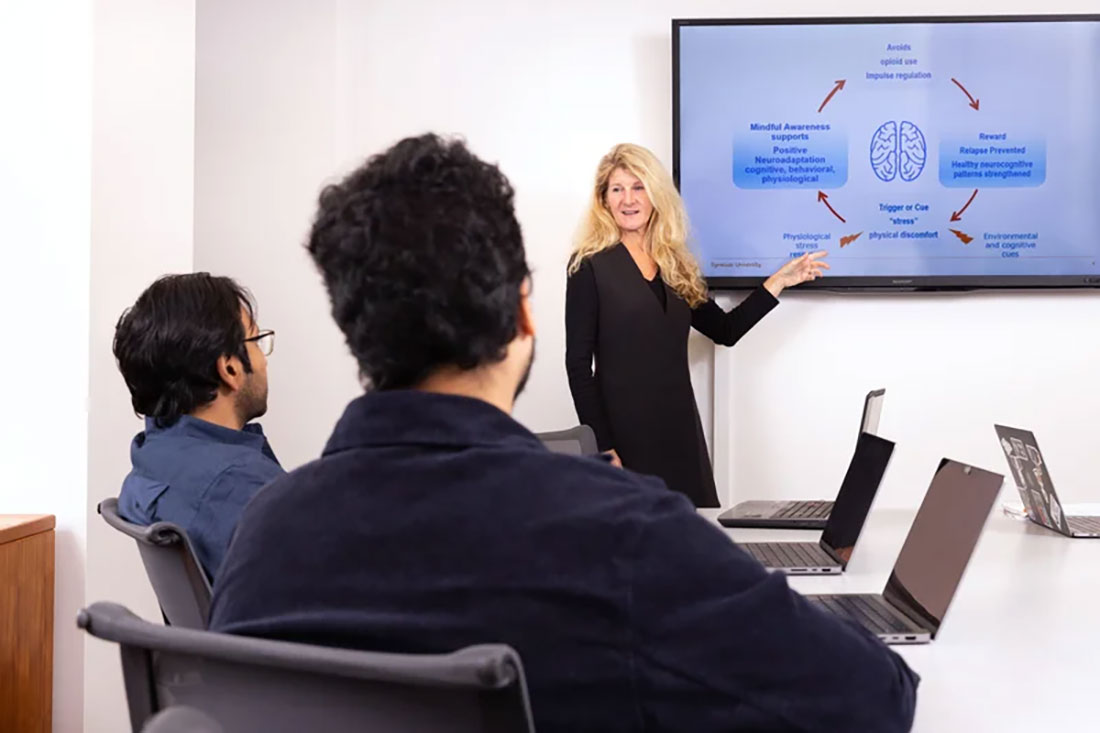
As the nation grapples with an ongoing opioid crisis that annually claims tens of thousands of lives, two Syracuse University professors are collaborating on a research project that they hope will help people receiving opioid use disorder treatment to curb their cravings and maintain their recovery. With the support of a four-year grant from the National Science Foundation, lead principal investigator Asif Salekin, an electrical engineering and computer science professor in the College of Engineering and Computer Science, and co-principal investigator Dessa Bergen-Cico ’86, G’88, G’92, a public health professor and coordinator of addiction studies programs in the David B. Falk College of Sport and Human Dynamics, have teamed up with the Crouse Health Addiction Treatment Services in Syracuse where they’re working with outpatients in recovery for opioid use disorder.
The patients—who receive medication for addiction treatment at the clinic—have volunteered to participate in this novel study, which seeks to create an automated, individually tailored intervention that integrates an adaptive artificial intelligence (AI) system with a sensor-equipped smartwatch to monitor changes in their neurophysiology. The goal is for the system to detect escalating stress—a known risk factor for opioid cravings and relapse risk—and prompt the patient to engage in mindfulness-based practices, such as breathing techniques and meditation, to reduce the neurophysiological stress response. “We’re combining what we know from the decades of research I’ve been involved in around mindfulness-based practices with veterans and other challenged populations and applying that to what we know about the neurophysiology of stress and addiction craving to establish more effective and sustainable recovery,” says Bergen-Cico, an expert in addressing substance use, trauma and addictive behaviors.

Monitoring Stress
Salekin specializes in assessing stress and anxiety using sensing technologies. “Stress is very diverse and a broad umbrella,” he says. “So how to identify the common markers across all the variations and effectively assess that information using passive sensors is an open research challenge that I’m fascinated to address.”
Salekin’s research team—which includes computer science doctoral candidates Harshit Sharma and Yi Xiao—is focused on creating an unbiased AI algorithm that will accurately reflect changes in an individual’s behavior. “We are working with an at-risk population, so we want the AI to be robust and trustworthy,” Salekin says. “We want to know how to avoid putting our patients in an adverse situation and incorporate that in the AI.”
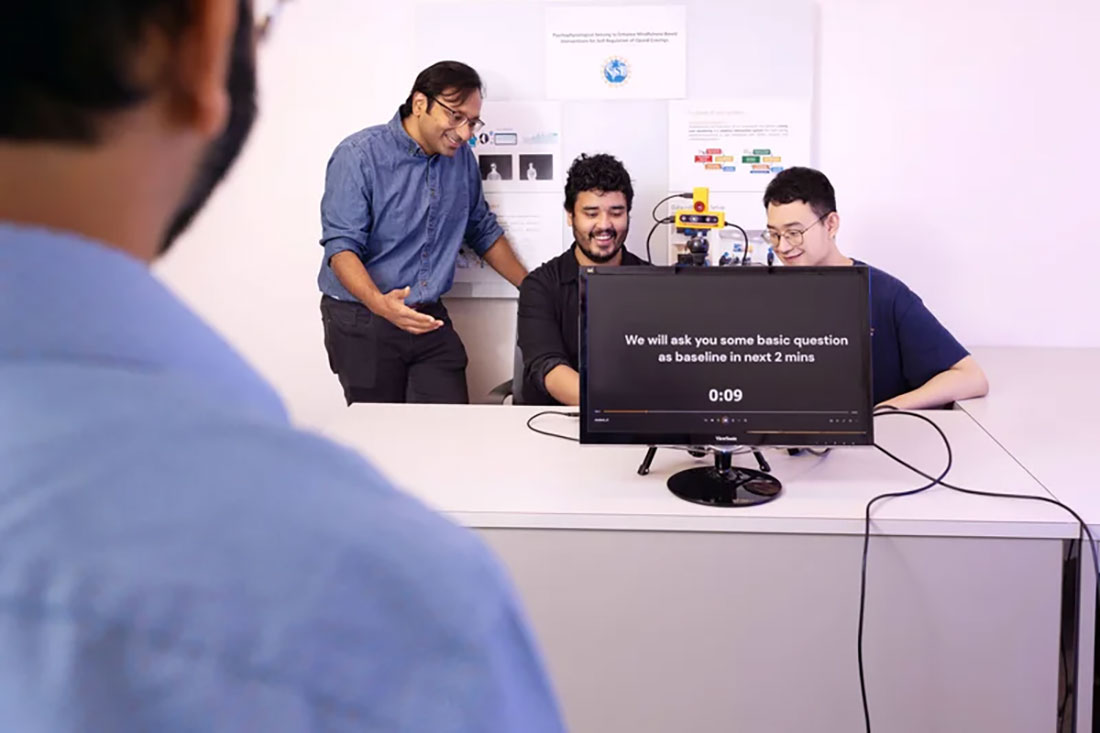
Revealing Results
In the project’s first phase, they set up a lab at the Crouse Health Addiction Treatment Services, and Sharma and Xiao conducted a Trier Social Stress Test on the patients to gather data on heart rate, heart rate variability, skin conductance, respiration and skin temperature (they also tested a comparison control group of non-opioid or other substance users from the Syracuse area). The test featured an interactive video with both relaxing and stress-inducing imagery and required participants to perform a series of tasks, including doing a timed counting exercise and a numbers game, recalling good and bad memories and creating a song in 30 seconds. The team used thermal and depth cameras as well as a radar-imaging device, which captures body movement and gestures, and a smartwatch with multiple passive sensors to capture the biometric data in real time.
According to Bergen-Cico, the stress test results revealed two important findings: The rate of the physiological stress response was much more rapid for people with an opioid use disorder, and they were unable to verbally recall a positive experience, a characteristic she attributes to reward deficiency syndrome. “That the patients can’t verbalize something positive in their lives is a groundbreaking finding and component of the study,” she says. “They are readily able to recall negative experiences, which produce dramatic physiological stress response, but they are seemingly unable to recall joy or pleasure in anything.”
“We’re combining what we know from the decades of research I’ve been involved in around mindfulness-based practices with veterans and other challenged populations and applying that to what we know about the neurophysiology of stress and addiction craving to establish more effective and sustainable recovery.”
~ Dessa Bergen-Cico ’86, G’88, G’92, public health professor
Now in its second phase, the project is moving from the lab to a home environment, where the patients will wear the sensor-equipped smartwatches, providing feedback that will help the researchers evaluate and adapt their algorithm. In the final phase, the researchers plan to pilot their invention, a fully automated AI intervention that brings all their research together where patients will be trained in mindfulness practices and prompted to use these practices when the AI detects neurophysiological stress response. If successful, they hope to apply for a National Institutes of Health grant that would lead to a medical trial.
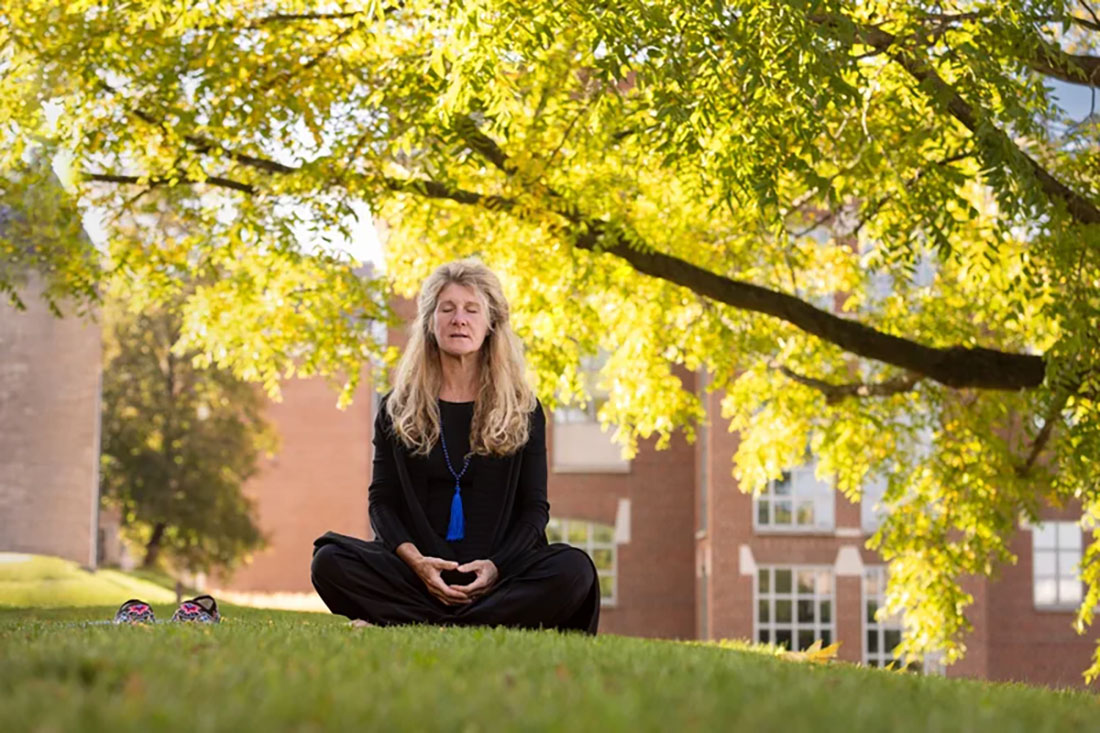
Unique Interdisciplinary Collaboration
Along with the project’s unique interdisciplinary collaboration and putting AI and mindfulness theories into practice, Bergen-Cico cites the importance of building community connections, crediting Monika Taylor G’99, G’17, G’18, director of the Crouse Health Addiction Treatment Services, as a key collaborator and project manager Susan Scholl ’81 for working with the clinic and coordinating recruiting. Both she and Salekin highly value the work of Sharma and Xiao, who communicated with the patients and guided them through the lab tests. Bergen-Cico says addiction studies and public health graduate and undergraduate students have also assisted with the project.
Sharma says it’s heartbreaking to learn about the patients’ lives and struggles but believes the team’s hard work and the technology they’re developing will truly have a positive impact. “It’s been an eye-opening experience understanding how people suffer after opioid use and how they’re trying to recover,” he says. “Being a part of this project and contributing little things to make it better for them makes my day.”
An SU Story by Jay Cox originally published on October 17, 2023.
Dance of Hope
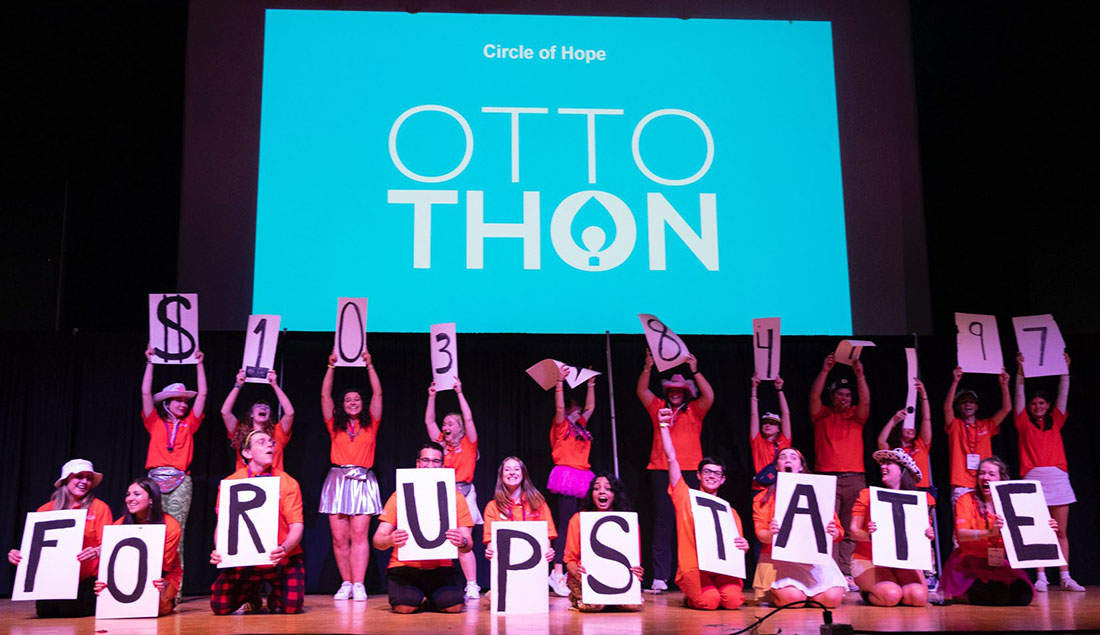
Why Falk College? And why OttoTHON?
For Grace Brashears, the answer to both questions is the same: She has dedicated her life to helping children and their families “while they walk the terrifying path that is pediatric illness.”
Brashears is a double major at Falk (human development and family science, and public health) who’s working toward becoming a certified child life specialist. In that role, Brashears will help children and families navigate the process of illness, injury, disability, trauma, and hospitalization.
But Brashears is helping children and their families even before she graduates in 2025. The junior from Holland, Michigan, was recently named the youngest executive director in the 10-year history of OttoTHON, Syracuse University’s 12-hour dance marathon that raises money for Upstate Golisano Children’s Hospital, which is adjacent to campus.
“It’s quite an honor,’’ says Matthew Mulvaney, associate professor and undergraduate director of the Department of Human Development and Family Science (HDFS). “This will be a wonderful representation of Syracuse values and an important show of support for children managing these challenges.”
OttoTHON is a part of a larger international movement of students fighting for a future without childhood illness. Hundreds of Dance Marathon programs throughout North America raise funds and awareness for Children’s Miracle Network Hospitals. In recent years, OttoTHON has raised more than $100,000 a year for Golisano.
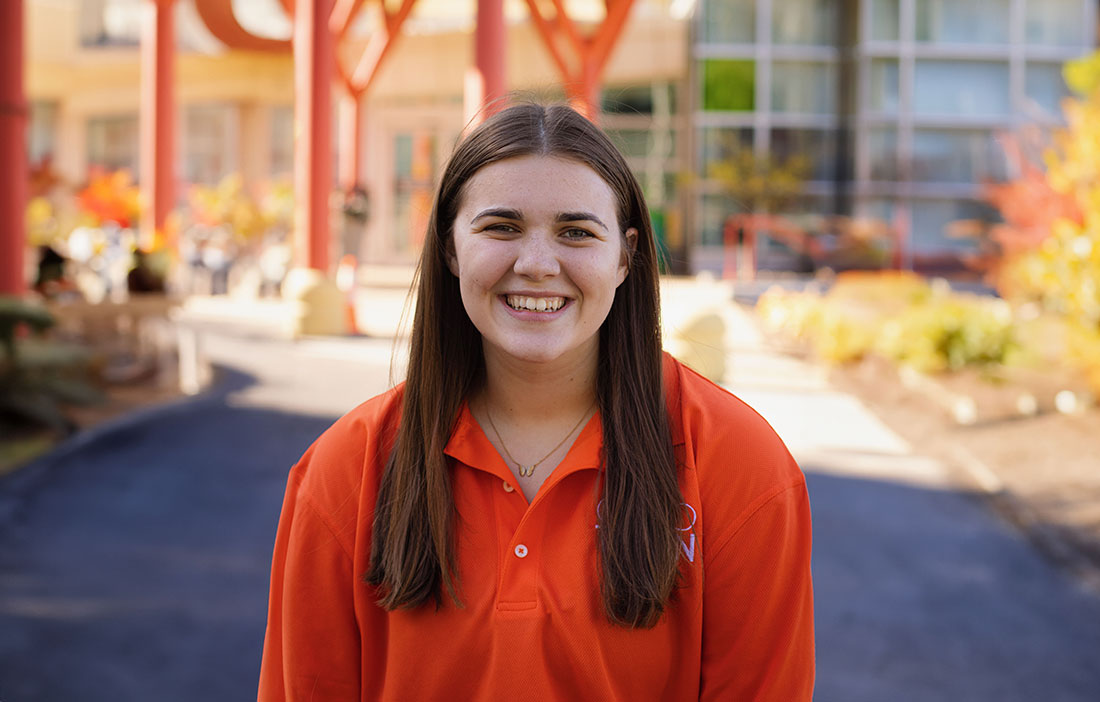
In a recent meeting with her HDFS faculty advisor and mentor, Professor of Practice Colleen Cameron, Brashears mentioned that she had been named executive director. Happy and excited for Brashears and how her work with OttoTHON reflects the social justice values of HDFS and Falk, Cameron asked Brashers to write a reflection about her appointment that Cameron could share with the department leadership.
We also asked Brashears to share her reflection with the wider Falk and Syracuse University communities. Here’s what she wrote:
“Throughout the year, OttoTHON plans and runs various small events, fundraising pushes, and support initiatives for the children and families who have been treated at Upstate Golisano. All of this leads to our large event in the spring, our 12-hour Dance Marathon. This 12-hour party is a celebration of all the kids and families who have and currently are walking the path of pediatric illness. Throughout this event, we play games, eat food, watch performances from several student groups, fundraise, hear stories from staff and families at the hospital, and, of course, dance.
“This year, I have the absolute honor of being the executive director for OttoTHON! After being a part of the OttoTHON Leadership Program as a first-year student and serving as the first-year recruitment co-chair on the executive board last year, I am thrilled to be able to step into this role during my junior year here at Syracuse.
“Pediatric illness is something that I have always been highly passionate about. Since I started the mini-dance marathon program at my high school (Holland Christian High School), my biggest ‘why’ for being a part of this movement is to ensure that no child or family ever has to feel that they are alone while they walk the terrifying path that is pediatric illness. Programs like Dance Marathon offer an opportunity for the local community to help fill the gaps in healthcare today through the funds they raise and the support they offer. This ‘why’ brought me to Syracuse University to pursue my degrees in human development & family science and public health with the goal of becoming a certified child life specialist.
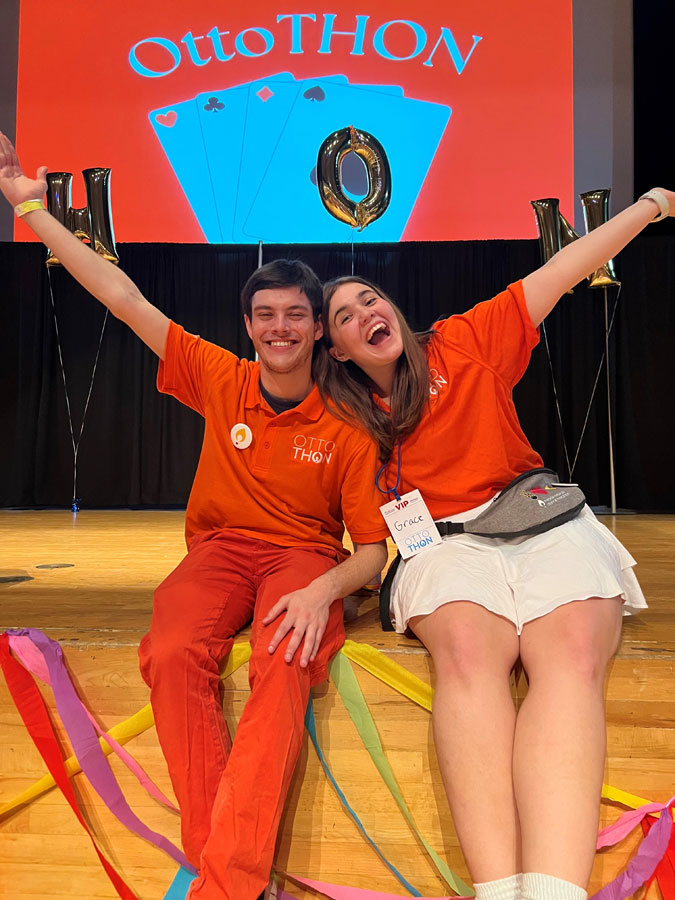
“As executive director, I oversee the organization and set the top priorities and goals for OttoTHON; manage and ensure that initiatives, fundraisers, and events run successfully; and assist in whatever capacity is needed. I also serve as a liaison to Upstate Golisano Children’s Hospital, the Syracuse University community, the greater Syracuse community, Children’s Miracle Network Hospitals, and other key partners. My ultimate responsibility and personal goal as executive director are to be sure OttoTHON does absolutely everything we can to ensure that the families we work with know there is a group of passionate Syracuse University students across the street from them who will do everything in our power to do anything that will make this journey even the tiniest bit easier for them.
“I believe it is vital for Syracuse University students to get involved in experiences that will get them into the local Syracuse community in a way that benefits the members of that community. As an out-of-state student, it can be easy to look at Syracuse, New York, as just Syracuse University; this is why it is essential to know that Syracuse is an entire community of people that goes far beyond the University. OttoTHON is a great way to begin to do this.
“If anyone is interested in joining the internal side of OttoTHON at this time, they can apply to be a part of a committee (applications coming out soon), or our new Team Captain program! If anyone is looking to participate but not be a part of the planning side of things, they can participate in the various small events we hold on campus, donate to the hospital through OttoTHON’s Donor Drive page, or register through our donor drive to be a dancer (participant) at our main event this spring! For more information on where to sign up, donate, or any other questions, please follow us on our Instagram @ottothon or email me at Ottothon@gmail.com.”
In addition to her OttoTHON activities, Grace Brashears ’25 is a Falk College student ambassador, Falk research assistant, Syracuse University orientation leader, and a member of Kappa Alpha Theta sorority.
Creating Inclusive Communities
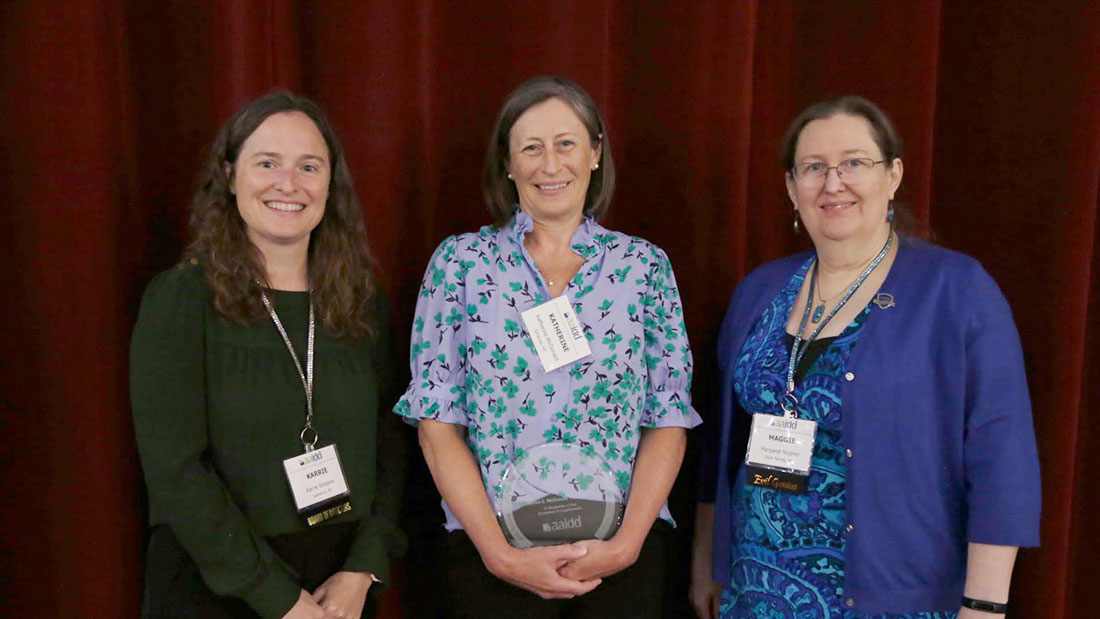
In June, Falk College Associate Dean of Research and Professor of Public Health Katherine McDonald will receive the 2023 Research Award from the American Association on Intellectual and Developmental Disabilities (AAIDD).
The award recognized McDonald’s recent research, but in many ways, it has been years in the making.
For nearly two decades, McDonald has led community-engaged research with people with developmental disabilities and advocated for the responsible inclusion of adults with intellectual disability in research. When she started, there weren’t many other researchers who were involved in that kind of work.
“I am thrilled to say that has changed drastically. Today, there are several of us doing this work, learning together how to infuse disability rights into science,” McDonald says. “Receiving this award from AAIDD is another sign of the groundswell of interest in this area, the recognition of its importance, and new opportunities to further grow and enhance this work.”
McDonald is one of two recipients of the Research Award, which AAIDD Executive Director and CEO Margaret Nygren says “recognizes (McDonald’s) formulations and investigations that have contributed significantly to the body of scientific knowledge in the field of intellectual and developmental disabilities.” George State University Professor of Psychology Rose Sevcik will also receive a Research Award.
McDonald and other awardees were honored at the 147th AAIDD Annual Meeting June 5-7 in Pittsburgh, Pennsylvania.
“Katie’s selection for this year’s Research Award from AAIDD is very fitting,” says Lutchmie Narine, Professor and Chair of the Department of Public Health at Falk College. “It recognizes her lengthy track record of interest and accomplishment in the field of intellectual disability.
“The Department of Public Health is very proud that one of our own is being honored with this nationally recognized award,” Narine adds. “Katie’s research is among the many areas in our department– infectious disease epidemiology, health communication, and health disparities, to name a few–that have attracted significant external grant funding.”
Founded in 1876, AAIDD is the oldest professional association concerned with intellectual and developmental disabilities. McDonald says professional organizations such as AAIDD play a pivotal role in recognizing and responding to changing social circumstances.
“When professional associations are on the right side of history and proactive in the appropriate uptake of new ideas, they can change research policy and practice by, for example, influencing expectations for the methods and focus of research and how new empirical insights are shared in and outside of the scientific community,” McDonald says. “It is great to see AAIDD leaders consciously pursuing initiatives in line with disability rights and encouraging to see the many ways my fellow award winners are doing the same.”
McDonald was honored for research such as this year’s this year study entitled “Eligibility criteria in NIH-funded clinical trials: Can adults with intellectual disabilities get in?” published in Disability and Health Journal. The co-authors were Ariel Schwartz from MGH Institute of Health Professions and Maya Sabatello from Columbia University, and the work was funded by the Collaboration for Unprecedented Success and Excellence (CUSE) Grant Program at Syracuse University. The CUSE grant and McDonald’s ongoing research led to additional funding from the National Institutes of Health to enhance inclusion of adults with intellectual disability in biomedical research.
McDonald discusses that research in more detail in this Q&A. Here, McDonald addresses the evolution of the disability rights movement and how that has dovetailed with her research:
“The disability rights movement has been afoot for decades; each success has led to new areas to push into to further advance disability rights. In my scholarship, I leverage progress and ideas from this anti-ableist social movement to transform how we conduct science. My focus is two-fold.
“First, as we pursue new questions of social importance, we need to re-examine ideas about sources of legitimate knowledge and make room in the scientific process for insights derived from lived experience. My scholarship involves community engagement—research done in partnership with people with disability. Community-engaged research allows us to pursue scientific questions of priority to people with disabilities, integrate their insights and concerns alongside empirical evidence, and pursue more socially just scientific research.
“Second, we increasingly position disability as a social factor and understand people with disabilities as a health disparities population. Generating scientifically derived knowledge inclusive of, and relevant to, people with disabilities is necessary for achieving health equity, yet too often people with disabilities are left out of research studies. My work seeks to challenge this decades-long practice and instead foster responsible inclusion of people with disabilities.
“More specifically, I build from key principles of disability rights that emphasize inclusion, the presumption of competence, and the right to make decisions for oneself, including those that might entail risk.”
McDonald’s research adds to a long history of noteworthy contributions that Syracuse University has made to AAIDD and highlights how University faculty have worked with self-advocacy groups, policymakers, schools, and social service organizations to promote disability rights. The hope now, McDonald says, is to continue building from this heritage and add new elements to this collective work.
“When I started in this area I would sometimes say ‘yeah, I do research about research’ and people’s eyes would glaze over with confusion and disinterest,” McDonald says. “Now, when I say I do community-engaged research and research to understand and address ethical, legal, and social issues in research with adults with intellectual disability, I see new understanding of its value and excitement about its potential. I so appreciate that my colleagues understand and understand the relevance of my work.”
Project ENGAGE is recruiting adults with intellectual disability as research participants. To learn more, call 1-800-295-2187 or email engageinpmr@syr.edu
View original story on SU News
Real-World Experience
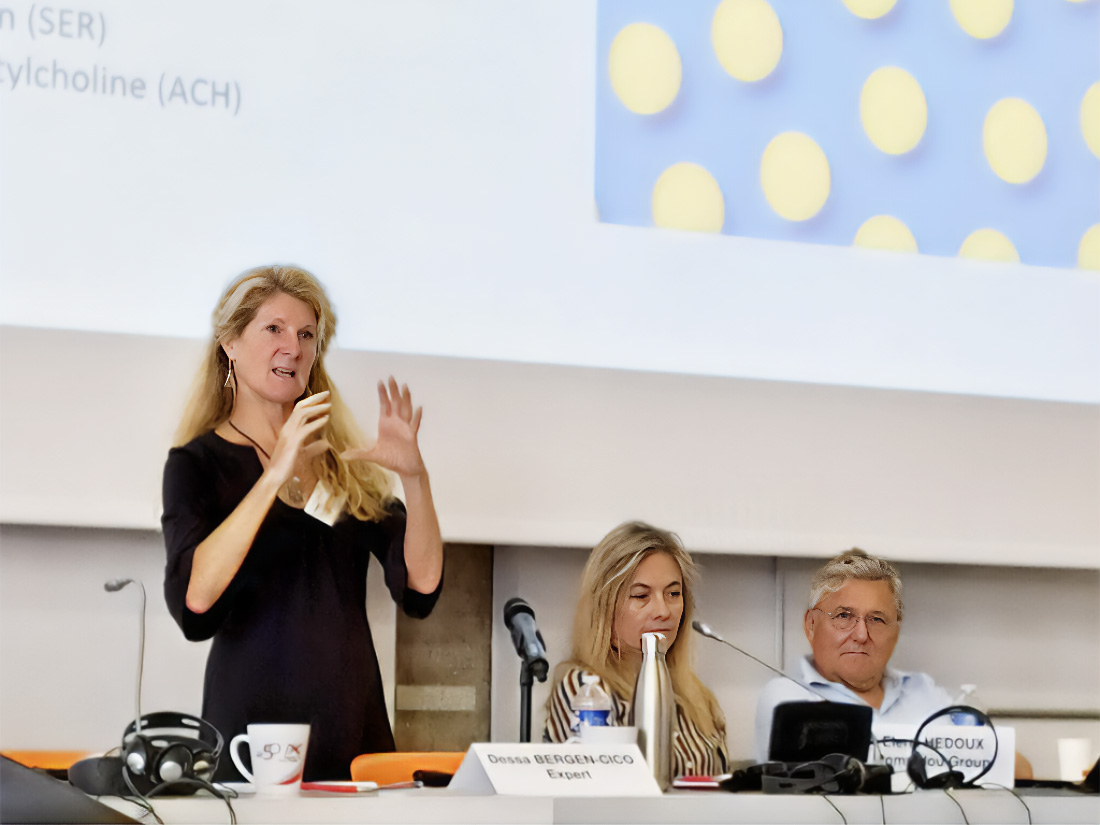
Needing one more class or an independent study to complete her master’s degree in public health, Emily Graham turned to Department of Public Health Professor Dessa Bergen-Cico for advice and Bergen-Cico offered the opportunity of a lifetime–a four-day immersion program in Strasbourg, France, in early June to participate in the International Drug Policy Academy (IDPA).
Bergen-Cico has been working with the Council of Europe’s Pompidou Group and International Cooperation Group on Drugs and Addictions since 2010, and she co-developed the IDPA with the Pompidou Group’s leadership team in 2018. The IDPA, an intensive professional development program divided into three modules over a period of one year, is designed for professionals from all over the world who work as managers or senior team members in the areas of drug policies and addictions.
For Graham, the IDPA showed her the value of cross-collaboration and understanding that there is more than one solution to substance abuse issues.
“The biggest takeaway for me was asking for help,” says Graham. “Sometimes when you get into executive positions, you feel like you need to figure it all out. But it’s OK to reach out and say, ‘Hey, what did you guys do and what were your results and how can we improve from that?’”
The IDPA is one of several unique opportunities for Syracuse University students to work with faculty and obtain global experience that exposes them to new ways of thinking about substance abuse and addictive behaviors. These opportunities are available to students who participate in the Addiction Studies program in Falk College that Bergen-Cico coordinates, and students like Graham who involved with addiction studies in other ways.
As an undergraduate student and Barnes Center at The Arch peer educator, Emily Graham was asked to oversee the Orange Recovery program for students who are in recovery from substance use disorder or sober curious. Soon after she received her bachelor’s degree in public health in 2022, she became the assistant director for the Lerner Center for Public Health Promotion and Population Health in the Maxwell School of Citizenship and Public Affairs. The Lerner Center’s mission is to improve population and community health through research, education, outreach, and health promotion programming focused on the social, spatial, and structural determinants of physical, mental, and behavioral health and health disparities.
A U.S. Navy veteran, Graham is particularly interested in health and wellness for military veterans, who have a high rate of substance use disorder. She says the IDPA gave her a global perspective on prevention that she couldn’t get anywhere else.
“Being in the U.S., you can get single-minded about how we’re handling it here,” says Graham, who recently received the Maxwell Staff Rising Star award. “But you’re seeing that drugs affect everybody, and we’re all trying to find a common solution and work toward a common goal.”
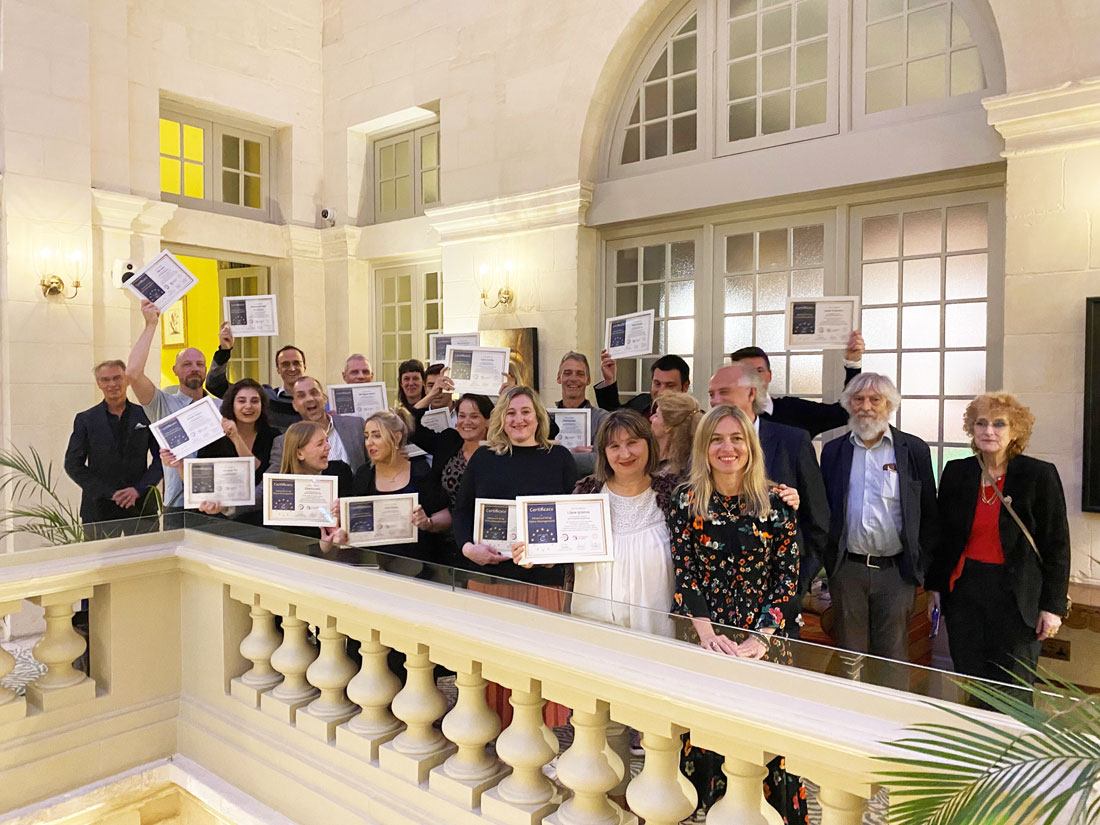
From Syracuse to Strasbourg
When he was the center director of Syracuse University Strasbourg, Raymond Bach created an internship program for Syracuse Abroad students through his collaborations with Pompidou Group Deputy Executive Secretary Thomas Kattau. The Pompidou Group consists of representatives from countries throughout the world who “provide knowledge, support and solutions for effective, evidence-based drug policies, which fully respect human rights,” according to its website.
In 2010, Pompidou Group leaders expressed an interest in having U.S.-based experts in addiction and drug policy work with them on executive training programs for European-based drug policy administrators and Bach connected them to Bergen-Cico, who had emerged as an innovative expert on substance abuse and addiction. By 2011, Bergen-Cico started providing opportunities for students from the Addiction Studies program at Falk College to participate in the Pompidou Group’s executive training programs and their first collaboration was held in Budapest, Hungary.
“Sasha Almasian Menkes ’13 was a public health and addiction studies student who participated much in the same way that Emily did this year,” Bergen-Cico says. “For the participants in 2011, the course was focused on emerging democracies in a lot of the former Soviet Union countries that were establishing independence and trying to find public health-based approaches to dealing with substance use and addiction.”
Over the years, the executive training expanded into the IDPA, which has evolved into a three-module program to accommodate increasingly complex topics and the growing number of attendees from all over the world. This year, Module 1 was held at the Daniel and Gayle D’Aniello Syracuse University Program in Florence, Italy, in March; Module 2 was held in Strasbourg in June; and Module 3 will be held in Valletta, Malta, in October.
“Drug policies have changed dramatically, certainly in the U.S and in the past 15 years globally,” Bergen-Cico says. “For example, we went from heavy prison sentences for possession of cannabis to it being recreationally legal or decriminalized for anybody 21 and over in the majority of U.S. states and many countries are following a similar path. That just gives you an idea of the landscape and the people who are working in this area need a lot of training to be brought up to speed.”
As the IDPA’s Vice Chair, Bergen-Cico builds the curriculum and is the lead instructor. The courses are designed for professionals from governmental and non-governmental institutions that develop and/or implement drug policies and coordinate related programs and service delivery. The most recent Strasbourg IDPA featured participants from 21 different countries, including Ukraine, Palestine, Mexico, and India.
“One of the great things to see is that people who have top posts in their country recognize they don’t know something, so they come to these trainings to keep up with it and be informed by their peers,” Bergen-Cico says. “That to me is impressive.”
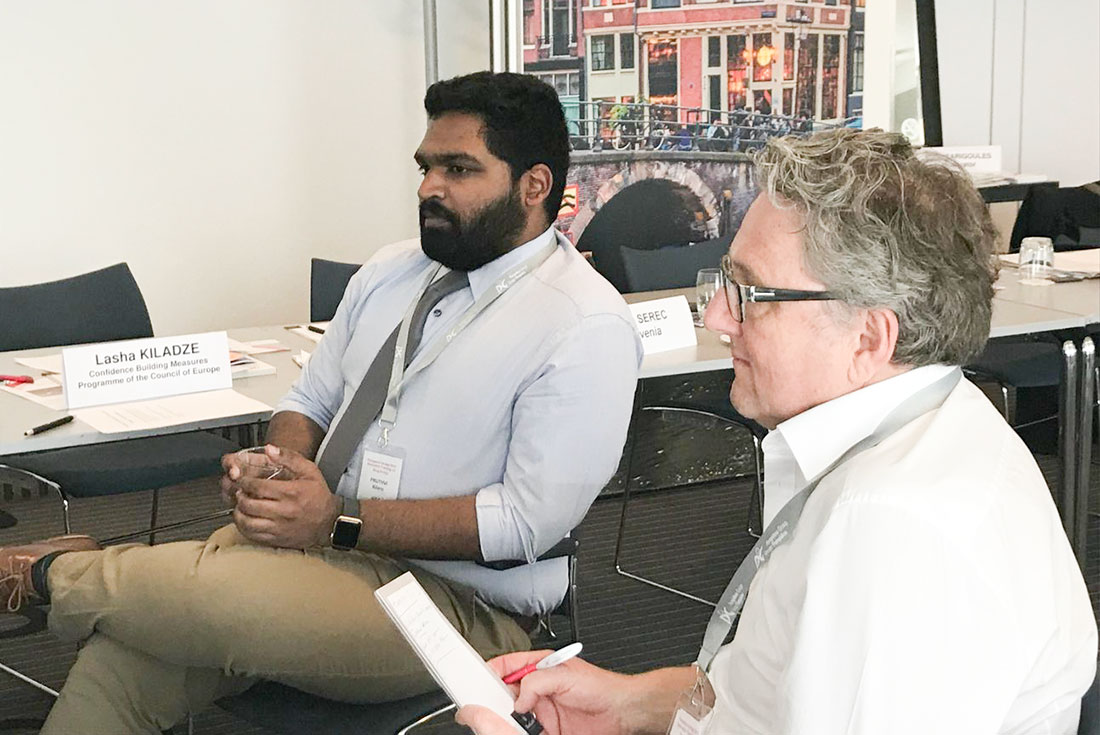
‘Global Health Experience’
Bergen-Cico modeled the IDPA’s curriculum after the addiction studies undergraduate and graduate programs that she coordinates at Falk. The topics are based on emerging issues around addiction, and the order of the modules is intentional with Module 1 focusing on neuroscience and the properties of drugs that help explain behaviors and challenges; Module 2 examining the principles of prevention; and Module 3 exploring how to integrate what was discussed in the first two modules into effective policy.
During her session in Strasbourg, Graham joined an integration assignment where five participants from various countries were asked to take what they had learned and devise a policy that satisfied all the countries. Graham says they couldn’t find a solution because many of the key factors–culture, religion, government structure–were vastly different.
“I found a new appreciation for the World Health Organization and how it can come to any kind of a solution when you have all of these countries represented,” Graham says. “I also have a newfound appreciation for global leaders who may appear slow-moving and out of date (with their policies).
“We were a group of five and we couldn’t come up with an answer because there are so many contributing factors,” Graham continues. “Some countries have over 100 religions and it’s amazing they can get stuff done in their own country let alone coming up with something that’s going to impact the entire globe.”
In 2019, Pruthvi Kilaru was a first-year master’s of public health student who, as a teaching assistant for Bergen-Cico, participated in her research on using mindfulness-based interventions for those with substance use disorders and trauma. As a result of their partnership–they had published several papers and co-authored a textbook chapter on the topic–Bergen-Cico invited Kilaru to attend the Pompidou Group’s Executive Training in Drug Policy in Amsterdam, Netherlands, in 2019.
The training in Amsterdam focused on gender-based issues. Historically, data shows that 85 to 90 percent of people in treatment for substance abuse identify as male, and the percentage was similar for people who are arrested for drug possession. But since getting arrested is the primary way for people to get treatment, the question is how to find treatment programs that are designed for men and women and how to get women to participate in them.
“The best part of the experience was being able to see the work Dessa and I did get considered and put into action,” says Kilaru, who earned his MPH in 2020 and is now a third-year medical student at Des Moines University in Iowa. “It also helped me get out of my comfort zone as I gave an impromptu presentation on the differences between gender roles, gender expression, gender identity, and sexual orientation, and how those were separate things but interrelated.
“Since then, I have always sought research opportunities where I could apply what I learned in order to improve the lives of others,” Kilaru adds.
As Graham moves ahead in career, she says she’ll always value the connections she made in Strasbourg and the “global health experience” that the IDPA provided.
“It doesn’t get more global than that, being in a room with people from 22 different countries,” says Graham. “It was invaluable to hear what they’re doing for drug policy and their countries’ attitudes and how the culture is different, how some countries are just now having a conversation about it, and where the U.S. falls into that. The need for cross-collaboration is so important because we can all help each other.”
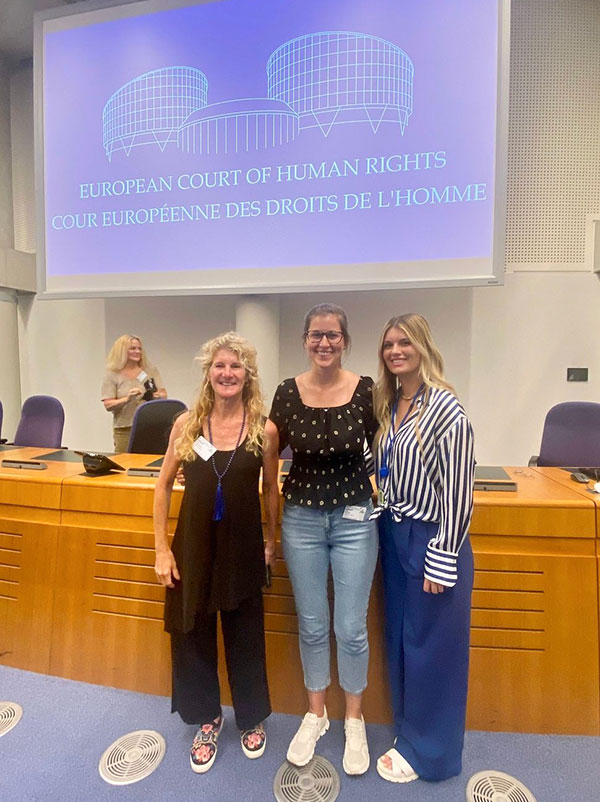
A Real-World Opportunity
With the opioid crisis in the U.S. and around the globe, addiction studies is a growing field and the IDPA is just one opportunity among several for Syracuse University undergraduate and graduate students to study these topics on campus and abroad. Bergen-Cico says there are established opportunities for students with the Council of Europe and Pompidou Group, and she’s working with SU Abroad on creating new ones.
The courses and professional development trainings that Bergen-Cico has created through her connections with the Pompidou Group provide an experience like no other offered to students in the U.S.
“It is the only such opportunity that I’m aware of, and certainly through the Council of Europe, where you have access to constituents in Europe but also Mexico, Egypt, Palestine, Peru, Israel, and India,” Bergen-Cico says. “It’s an international opportunity to look at a subject that crosscuts around the globe and literally have the opportunity to interact and learn from the experts and officials making those decisions.”
Graham, who earned her MPH at the end of June, recommends that other public health students pursue their master’s degree and take advantage of traveling abroad if they can.
“Something that I’ve really enjoyed about my master’s at Falk is that I’m able to apply what I’ve learned in my undergrad to real-world situations and critically think and become a leader,” Graham says. “Any opportunity you have, just take it. The classroom is great, but these real-world experiences allow your learning to go that much further.”
Kilaru agrees, recommending that students “just take the leap and do it.”
“Your experience will be very different from mine, but as long as you go into it with an open mind and are willing to take yourself outside your comfort zone you will learn a lot and make some really good friends,” Kilaru says. “Also, do not go into it thinking you are the lowest person on the totem pole! Everyone is on equal footing when you get there, and your opinion is just as valuable as theirs.”
With the current substance abuse crisis, Bergen-Cico says there is a high demand for students with a background in addiction studies from a variety of employers: state agencies, county health departments, non-profit and non-government organizations, advocacy groups, and the list goes on.
“And even if the substance abuse component is not your primary focus, it always has a tangential connection to it so having any type of out-of-the-classroom experience is vital and important,” Bergen-Cico says. “It’s an exciting, wide-open field and I get requests from all over the place with job opportunities for drug abuse prevention and control.”
If you’re interested in learning more about the addiction studies program at Falk College, visit the Addiction Studies course catalog page or contact Bergen-Cico at dkbergen@syr.edu.
An Inside Look at a Solution Combating Mosquito-Borne Diseases
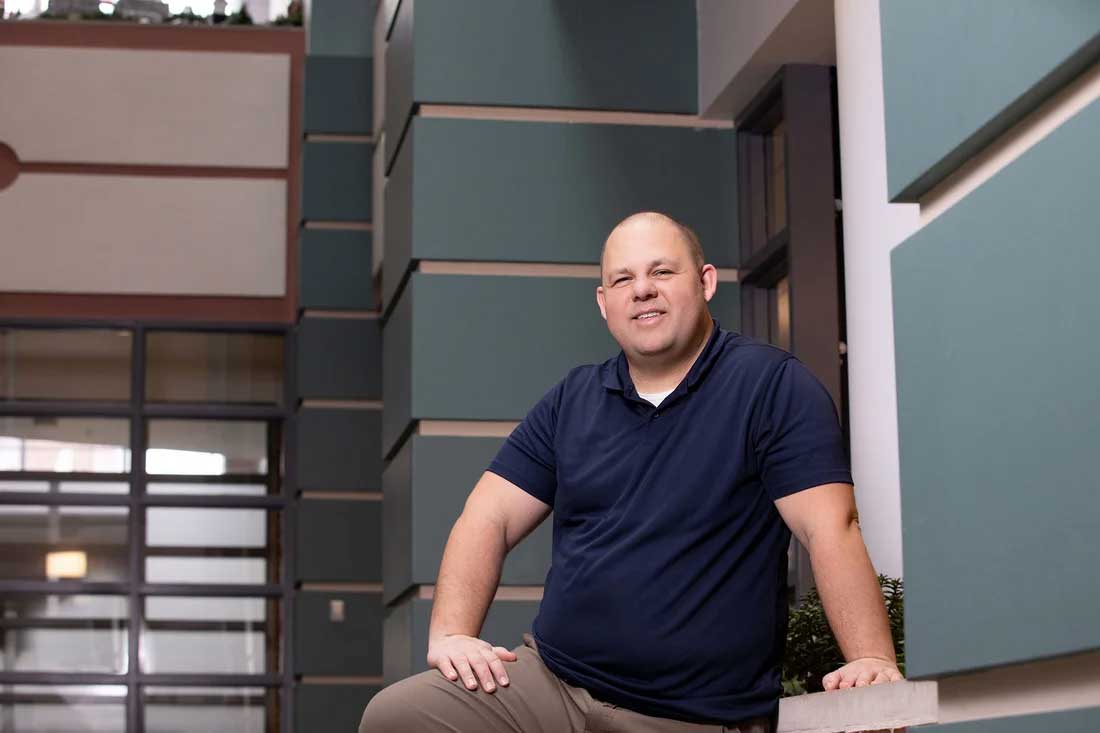
The Aedes aegypti mosquito represents a serious global public health threat. An inhabitant of subtropical and tropical environments, it transmits several viruses, including dengue, chikungunya, zika and yellow fever. Dengue, for example, infects an estimated 100-400 million people worldwide and claims upwards of 40,000 lives annually, according to the World Health Organization. At a time when current interventions—such as sprayed insecticides—can prove inadequate, David Larsen, a public health professor at Falk College, is looking to curb Aedes aegypti’s transmission of debilitating and deadly viruses. “Humans have been trying to control mosquitoes for millennia,” he says. “Mosquito-borne diseases cause a lot of human misery around the globe. We need solutions for that.”
To that end, Larsen is exploring the effectiveness of a novel device known as the Dried Attractive Bait Station that he co-invented. The lure-and-kill device features a black foam surface that has been soaked in a sugar-boric acid solution and dried. Since mosquitoes like dark areas and feast on sugar for energy, they are drawn to the device and killed when they ingest the toxic solution. “The black color attracts them,” he says. “They land, eat and die.”
Larsen first began work on the project in Ecuador several years ago and received a patent for the device in 2019 along with fellow researchers Marco Neira, now with The Cyprus Institute, and Anna Stewart-Ibarra ’07, G’12, formerly with SUNY Upstate Medical University and now executive director of the Inter-American Institute for Global Change Research in Uruguay. “Our first idea for the device was like a hummingbird feeder and one of them leaked in the cage,” he says. The next day, the accidental spill had dried and with it laid dead Aedes aegypti—100% mortality, Larsen says. “It was a fortunate mistake.”
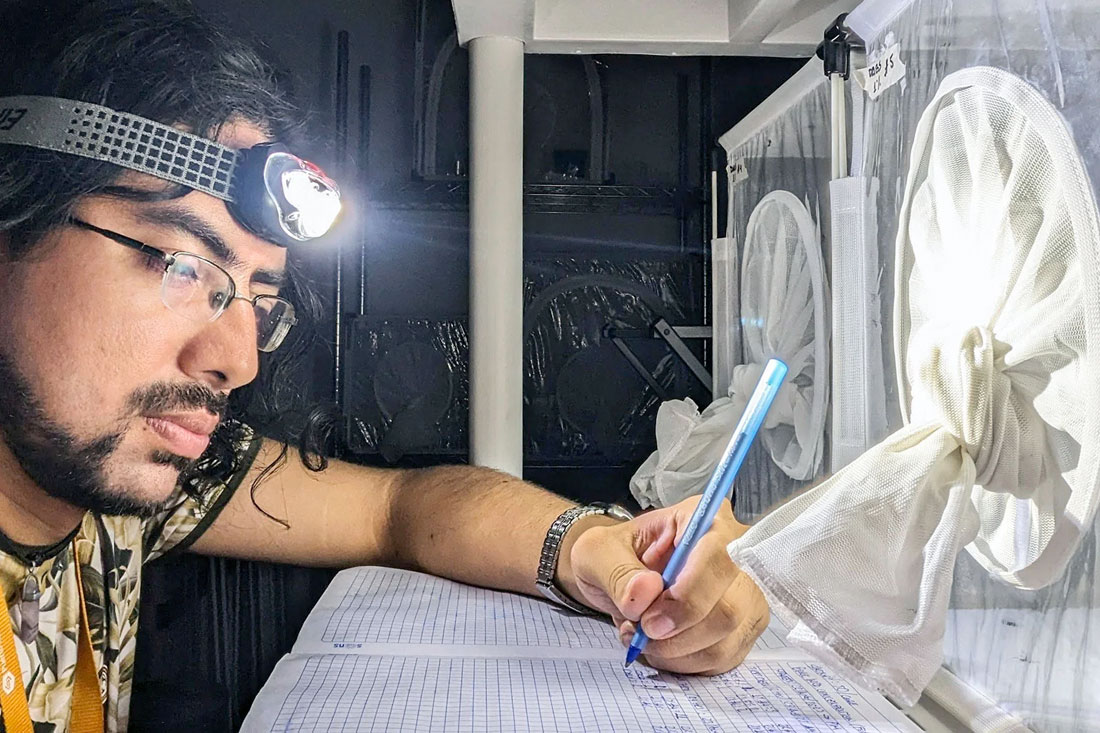
Seeking To Reduce Dengue Transmission
This summer, with funding support from the U.S. Centers for Disease Control and Prevention branch in San Juan, Puerto Rico, Larsen and Falk College postdoctoral researcher Leonardo Ortega López are testing the device in Ponce, Puerto Rico. They’re working closely there with the Puerto Rico Vector Control Unit (PRVCU), a nongovernmental organization that shares their goal of reducing the Aedes aegypti population to mitigate the spread of dengue, the most common vector there. Ortega López did field work on the mosquito in his native Ecuador for his doctoral degree from the University of Glasgow. He joined Larsen this year following research work at the Pasteur Institute in French Guiana. “I’m very interested in the behavior and ecology of these insects,” he says. “I feel that my work is also important in terms of preventing diseases and improving the health and welfare of people.”
Known as “container breeders,” Aedes aegypti inhabit urban areas, especially neighborhoods where water accumulates in everything from old tires to plastic containers. The females readily find blood meal (humans preferred) to produce eggs and lay them in standing water. Ideally, they find everything they need in and around homes—blood and sugar sources, water and dark places where they can rest and feel safe from predators. “The behavior of Aedes aegypti has evolved to live in close contact to people,” Ortega López says.
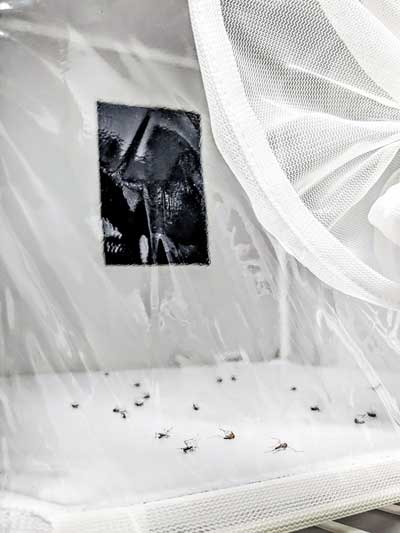
Optimizing the Lure-and-Kill Device
This summer, Larsen and Ortega López established a four-room, mosquito-proof experimental house, with the goal of optimizing the design of the Dried Attractive Bait Station, including its size (it’s about four inches in diameter), the number needed per room, and the optimal lethal dosage of the solution. “Our focus is on testing the device’s ability to attract the mosquito and then kill it,” Larsen says.
Ortega López tested the concentration of boric acid in the solution on female mosquitoes he’s breeding in the PRVCU lab. Through December, he’ll perform tests in the experimental house to gather data. The devices will be placed in white rooms where they will be the only dark spot. He’ll release 50 female mosquitoes each time and then recover them with an aspirator, dead or alive. In particular, they’re focused on older females, the most productive egg layers. “If we can reduce that aged population, then we’ll have a bigger impact on transmission,” Larsen says. “That’s what we’re hoping to see.”
Next summer, they plan to test the bait station in a field trial, placing the device in upwards of 300 homes to track its impact on the Aedes aegypti population. From there, Larsen will seek funding to conduct a community randomized trial, putting the devices in homes in 20 communities and comparing the dengue transmission with that of 20 communities that aren’t equipped with the device. “Two cool aspects of the device are that it’s really cheap and doesn’t require electricity,” he says. “That means that if it works, it could be a game changer for mosquito-borne disease.”
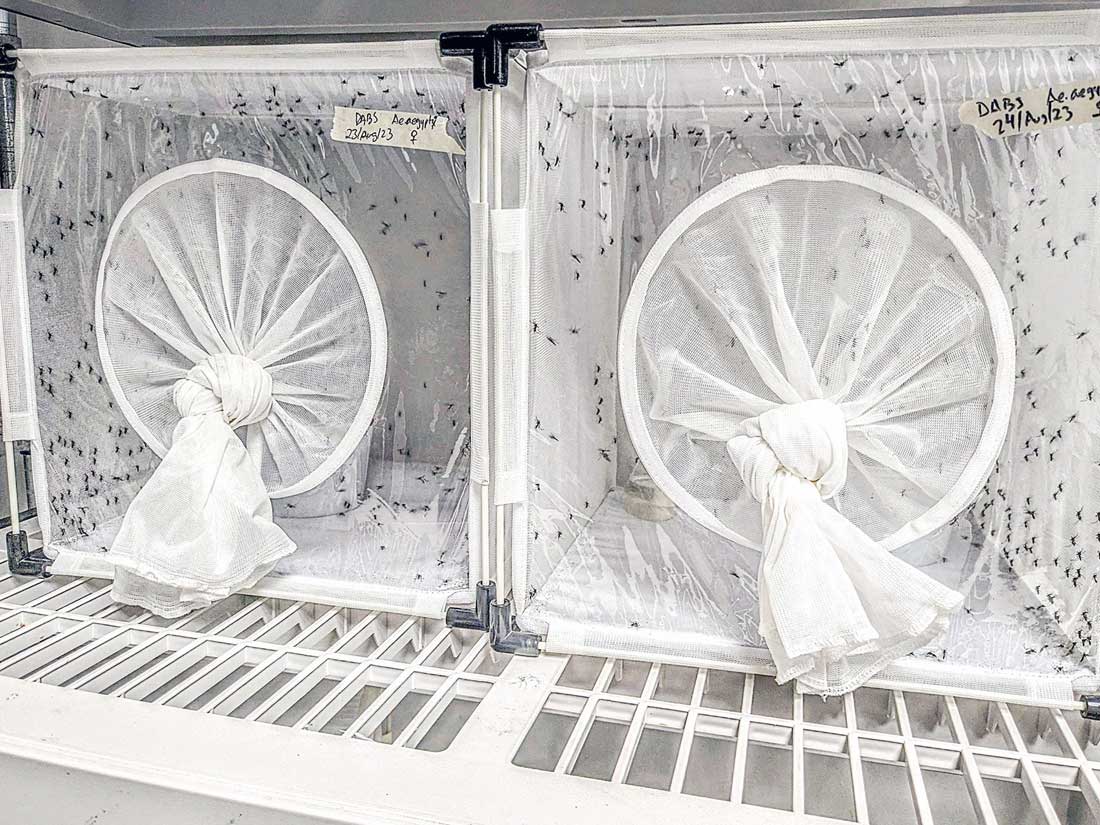
Changing Climate Concerns
Larsen sees potential for the device in other areas inhabited by disease-spreading mosquitoes with similar behaviors. Climate change magnifies the issue even more. Malaria cases, for example, have appeared this year in Texas and Florida. As ecosystems evolve from warming climates, Ortega López says Aedes aegypti populations could expand beyond changing latitudes to greater altitudes as well, spreading into areas of the Andes, for instance, where it’s too cold for them now. “That’s a big problem, because you will have populations that haven’t been exposed to these diseases,” he says.
Continued research and surveillance are crucial to safeguarding public health, and as Larsen notes, dengue may not be a big concern for mainland America, but it’s a major public health issue globally. “With climate change,” he says, “dengue is likely to get worse.” And he hopes the simple device he helped create will play a part in the solution to reducing transmission.
~ An SU Story by Jay Cox originally published on September 12, 2023
Q&A With Falk College Dean Jeremy S. Jordan
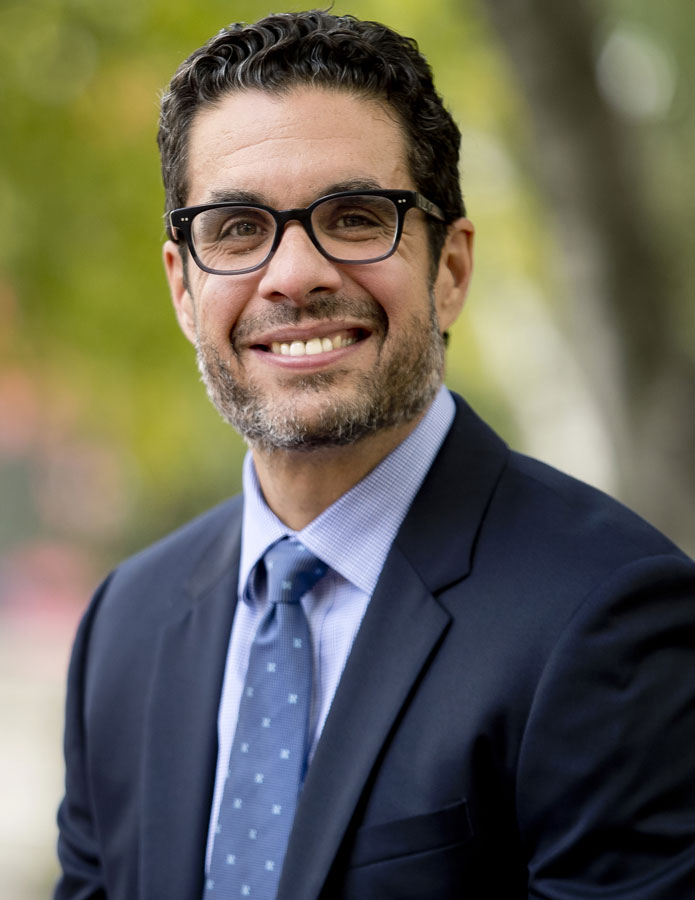
Jeremy S. Jordan, new dean of the David B. Falk College of Sport and Human Dynamics, was inspired to become an academic leader to be of service to others in pursuit of their aspirations.
“I enjoy creating processes and building structures that help others achieve their professional goals. My role as dean is to help our students, faculty and staff in Falk by removing barriers that can prevent individuals from accomplishing their goals,” says Jordan, who was most recently vice provost for faculty affairs at Temple University in Philadelphia. “Additionally, I enjoy the ability to work across campus and form interdisciplinary partnerships that are mutually beneficial for all parties.”
In this Q&A with Syracuse University News, Jordan, who started in his new role Sept. 1, discusses the academic journey that brought him to Syracuse, shares the opportunities ahead for the Falk College and reveals something unexpected that keeps him going the distance.
Tell us about the academic and professional journey that brought you to this point.
After I completed my Ph.D. at The Ohio State University, I served as a faculty member in sport management at the University of Memphis, Mississippi State University, University of Miami and, for the past 15 years, at Temple University. My different roles at Temple included professor of sport management; director of the Sport Industry Research Center; senior associate dean in the School of Sport, Tourism and Hospitality Management; NCAA Faculty Athletics Representative; and, this past year, vice provost for faculty affairs. My time in administration these past six years prompted me to pursue additional leadership roles, which is how I ended up as the dean of the Falk College. I am thrilled to join the team at Falk and become a member of the Syracuse community.
What sparked your interest in pursuing a leadership position at Syracuse?
This is a world-class institution with a proud tradition of academic excellence; I am inspired to be part of this community. Additionally, Syracuse has demonstrated a strong commitment to diversity, equity, inclusion and accessibility (DEIA); student success; and social justice. All these areas align with my professional and personal interests. I view Syracuse as a place where I can continue to grow both personally and professionally by working with some very talented colleagues.
As you begin in your new post, what are you most excited about?
Learning more about the traditions at Syracuse and enjoying living in Central New York. I am also excited about the opportunity to advance the Falk College by working with all the different stakeholder groups that comprise the overall community.
Looking at academic priorities specific to your college, what are the greatest opportunities ahead?
Complete the Academic Strategic Plan for Falk so that we understand our priorities and how we plan to achieve our established goals. Invest in areas of the college that provide the greatest opportunities for academic excellence and future growth.
In five years, what do you hope to have achieved as dean of the college?
- Elevate the research profile of the Falk College by providing the necessary resources and support for our students and faculty.
- Increase the percentage of Falk students who study abroad and away.
- Build stronger connections with industry partners, alumni and donors.
- Be viewed as a leader in DEIA programming and practices.
- Achieve a level of financial stability that provides opportunity for continued growth and support for students, faculty and staff at Falk.
What advice do you have for our incoming students, both undergraduate and graduate?
- Be an active learner. Take ownership of your education and professional development.
- Meet as many new people as you can. Expand your personal and professional networks.
- Plan to study abroad or away; these are life-changing experiences.
- Use your time and talents to improve the lives of those around you, especially those who have not been provided as much opportunity.
- Attend a play, art exhibition, sport event, lecture, concert or some other new experience. Give yourself the opportunity to grow and learn new things.
- Utilize all the resources available at Syracuse that will help you achieve your academic and professional goals.
- Enjoy your time at Syracuse; it will go by much too quickly.
Quick questions
Kindle/e-reader or old-school books? Old-school books.
Movies or series? Series—I never seem to have time to watch a full movie unless I am on a plane.
Take out or dine in? Favorite cuisine? Dine in. I love all food but really enjoy a good taco.
Museums or theater? Theater.
Ocean, lake or mountains? Domestic or abroad? R&R or adventure? Ocean, abroad, active relaxation.
Night owl or early riser? Early riser—definitely not a night owl.
Favorite season? All of them except for winter. I realize I might be in trouble moving to Syracuse.
Something about you no one would expect? I have run 12 full marathons and over 20 half marathons. I will never be fast enough to win but I enjoy the experience, most of the time.
View original story on Syracuse University News.
Video: Explore Careers in D.C.
Falk College will return to D.C. October 22-25, 2023. Learn more about the Falk in D.C. 2023 trip and apply.
Page 6 of 26
